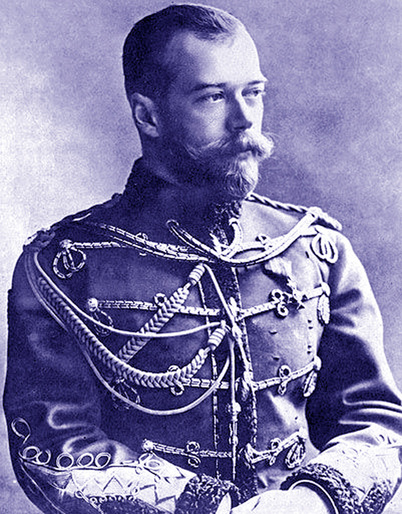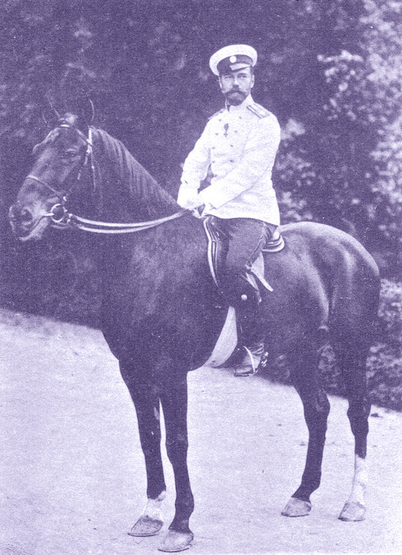Tsar Nicholas II (1868-1918)Nicholas II, said by everyone who met him to be a personally very likeable man, was unfortunately not, it seems, born with the inner qualities necessary to govern a country as large and complex as Russia on his own. He seems to have had the character more closely associated with that of a country squire than a Tsar. He was a loving family man, very close to his wife and children, born from a love match to Alexandra, something frowned on at the time by his parents.
The world the young Nicholas II grew up in was dominated by the personality of his grandfather, the Tsar Liberator Alexander II. Alexander’s liberal policies had a rejuvenating effect on mid-19th century Russia, which had long suffered under the effects of the rule of Alexander’s repressive father Nicholas I (1825-55). Alexander II’s liberalisation of Russian life and politics backfired on him however. On the very day that he was on his way to sign over all his autocratic power to a freely elected parliament, he was assassinated by a group of terrorists, who threw a bomb at his carriage. These terrorists, called “The People’s Will” in reality had nothing whatever to do with “the people”. They were in fact a small minority group who correctly saw that in a liberal democracy, they would have no chance of ever wielding power. So they did the only thing they could think of. Assassinating the Tsar was an astute move in the light of the character of Alexander II’s son, the Tsareivitch. He was everything Alexander II was not. Autocratic, controlling and extremely reactionary, the new Alexander III instituted a brutal police state that Russia would not see the like of again until Stalin’s time 40 years later. Alexander III’s controlling nature and his tendency to want to do everything himself, led to young Nicholas (future Nicholas II) getting to do almost nothing of any importance. Indeed, he grew up knowing nothing of how the political institutions of Russia worked and inheriting from his father merely a vague notion of Autocracy. He was, on his accession following his father’s rapid decline and death in 1894, the man in charge, but with no notion of where his country was at, or what it meant. And the way he had been brought up did not fit him very well to govern once he was in charge. He was a man who hated conflict. So much so that he would often be very nice to a politician who had been summoned into his presence, only for that same politician to discover, hours later, that he had in fact, been fired. This was not endearing as people rapidly gained the notion that although Nicholas was personally very nice, where matters of state were concerned, he could not be trusted. And, it was further thought that, being somewhat weak in character, he was under the domination of his wife. As Alexandra was German, this became gradually to be quite a problem, especially during the war, when rumours abounded that Alexandra was a German spy and working against Russian interests. There were even postcards and art produced at the time that openly said this. Added to this the secrecy surrounding the condition of the Tsarevitch and the presence in the intimate circle of Rasputin, about whom some facts were known, but even more speculated on, and you can see that Nicholas and his family were riding for a very heavy fall. Eventually, pressures due to the conduct of World War I, in which Russia suffered horrific loss of life for little or no gain were the final straw The repressions of Alexander III, the weak and vacillating character of Nicholas II, the illness of the future Tsar Alexei and the secrecy surrounding it, played directly into the hands of the political group behind the murder of Nicholas’ grandfather. They were later to emerge as the Bolsheviks, who finally took power in the coup of October 25th 1917, destroying in the process the democratic ideals of Kerensky’s February Revolution. The family’s enemies had played “the long game” and won. In July 1918, Nicholas and (most of?) his family were executed and Russia fell into a darkness from which it is yet to recover. |
Tsaritsa Alexandra | NEXT PAGE |
All website content copyright © Steven Ingman-Greer. All rights reserved.


